- Home
- P. N. Elrod
The Hanged Man
The Hanged Man Read online
Begin Reading
Table of Contents
About the Author
Copyright Page
Thank you for buying this
Tom Doherty Associates ebook.
To receive special offers, bonus content,
and info on new releases and other great reads,
sign up for our newsletters.
Or visit us online at
us.macmillan.com/newslettersignup
For email updates on the author, click here.
The author and publisher have provided this e-book to you without Digital Rights Management software (DRM) applied so that you can enjoy reading it on your personal devices. This e-book is for your personal use only. You may not print or post this e-book, or make this e-book publicly available in any way. You may not copy, reproduce, or upload this e-book, other than to read it on one of your personal devices.
Copyright infringement is against the law. If you believe the copy of this e-book you are reading infringes on the author’s copyright, please notify the publisher at: us.macmillanusa.com/piracy.
For Mickee
ACKNOWLEDGMENTS
Heather Fagan,
Dan Hollifield and Lindsey Burt-Hollifield.
High five!
PROLOGUE
In Which Vital History Concerning Her Majesty Is Revealed
When informed at the age of ten that she was likely to be queen of England, it was reported that Her Royal Highness Princess Alexandrina Victoria of Kent replied, “I will be good.”
What she actually said was, “I will do good.”
Sometime in 1835—it is a well-kept secret—the sixteen-year-old princess escaped her highly managed routine and spent two weeks walking incognito among commoners. The revelation of how ordinary folk lived and died made a profound impression on young “Drina.” She resolved to improve the lot of her people, especially that of women.
During this taste of freedom, she met the dashing Lord Arthur Godalming, who was in the right place at the right time to rescue her from street ruffians. It was love at first sight for both, and when she became queen two years later, iron-willed Victoria defied custom and changed law so she could marry a peer rather than a prince.
The love match of Victoria and the Lord Consort Arthur marked the beginning of a new era of enlightenment for England.
Her progressive policies, particularly the historic “Time of Women” Equal Franchise Act of 1859, which granted voting rights to women, changed the world.
The young monarch made her childhood declaration a reality.
Victoria’s empire now circles the globe, but the brass and steam progress of the Industrial Revolution disturbed dark forces. Reason and science were in vigorous conflict against fear and superstition. The empress could not ignore the fact that something was supernaturally rotten in the state of England. In 1847 she called for the creation of a new department within the Ministry of Science.
This special branch, Her Majesty’s Psychic Service, dedicated to investigating all matters supernatural, employs the psychical gifts of those who serve in it to protect and preserve the realm.
Here follows the story of one of her agents.
CHAPTER ONE
In Which Miss Pendlebury Is Called to Duty
LONDON, ENGLAND,
CHRISTMAS MORNING 1879
No commonplace death would require Alex’s presence at such an ungodly hour; calls to the house of a Reader at two in the morning were never of a social nature. She girded her emotional barriers for the possibility of brutal murder and sent up a silent request that it would not involve a child. Those were the worst, though, of course, none were ever pleasant.
Someone rang the front entry bell just as she was about to put out her candle and attempt sleep. Mrs. Harris, the housekeeper, was away visiting relations for the holiday, taking along the page and the maid, so Alex herself slipped downstairs. She did not bother with slippers, throwing a blanket about her shoulders against the chill.
A man’s looming form showed through the door’s frosted glass panels. He was too tall to be Sergeant Greene, who must also be away visiting family. Everyone had a holiday except herself, the luckless fellow sent to fetch her, and death.
She used her candle to light the gas sconce, instantly brightening the foyer. Wary for problems, she slid open a discreet drawer in the foyer table where she kept a revolver.
Clutching the blanket to her throat, Alex threw the bolt with her free hand and opened the door to the freezing night.
“Miss Pendlebury,” said the tall man on her step. “You’re needed.”
The stranger held out a folded paper and, after his initial glance, looked at some point above her head, politely not noticing her state of dishabille.
He did not mistake me for a housemaid, she thought, sliding the drawer shut on the revolver. Why is that? Not from the blanket or what was visible of the nightdress under it. Then she remembered that no respectable servant would venture forth barefoot and without cap or dressing gown. Only the master or mistress of a house would do so. This was Baker Street, not Grosvenor Square, therefore the master or mistress of a house were not above answering their own—
She cut that thread of thought and took the paper. Scrawled in pencil was a Harley Street address and the name of the detective in charge of whatever investigation was presently taking place. Inspector Lennon, the toughest of a surly lot … he’d be in a fine temper getting called in at this hour. He’d want things wrapped up quick to have the coming day free for Christmas dinner with his family.
Alex had a surfeit of relatives herself, but no intention of dining with any of them. A cold supper, hot cocoa, a good book, and sweet solitude by a crackling fire suited her better. That, and not being called to Read a suspicious death.
She abruptly noticed it was sleeting, rice-size beads collecting on her caller’s shoulders and hair. “Oh, you must be frozen. Come in, Lieutenant.” She stepped back to make room for him.
“Thank you, miss, don’t mind if—” He got that look they always get. “Beg pardon, but how did you—?”
His regulation boots below his heavy ulster, hat tucked under one arm, and ramrod posture had given him away as a military man. She’d taken those in with her first glimpse, hardly aware of the process between observation and conclusion. While he could have been a sergeant, she added in his general manner, the cut of his hair, his carefully trimmed moustache and, of course, his accent, placing him as a scion of an upper-class house who had found a place in the Service. Whether he’d volunteered or had been transferred over as punishment for some infraction such as passing the port in the wrong direction at dinner, she did not know or care.
It would do no harm to add to her reputation; Alex preserved the mystery and made no reply.
“I shall return directly,” she said, pointing to a chair where he could wait.
“Yes, miss. They asked you to hurry, if you’ll pardon my saying.”
“They always do, but the dead are a patient lot, I think.”
“Yes, miss,” he somberly agreed, this time not reacting to her knowledge that a death was involved. It was, after all, her trade.
She did not rush upstairs, but once there made a speedy toilet. Not knowing whether she’d be indoors or out, she prepared for the worst: long woolens under her winter knickerbockers, a wool waistcoat over a wool blouse. Her new cycling boots that went up to her knees took forever to button, but once done, she was ready for anything.
Alex descended the stairs smartly, pulling on gloves. Her driver rose, his mouth agape for an instant before he clamped it shut and assumed a studiously blank expression. She placed him as one of the vast number of males who still found females who chose to wear practical clothing to be an amusing (or even
shocking) novelty. Punch printed many a cartoon in reaction to the transformations in fashion.
“Please, sir, we’ve had the vote for decades. Accustom yourself to fresher progresses” was the caption of one showing Lord Nelson’s statue swooning at the sight of two respectable ladies in trousers strolling Trafalgar Square. Alex bought several postcards of that one to share with a few female friends who would appreciate the humor.
The emancipation the Equal Franchise Act gave to women had been the law of the realm for twenty years, but some men still grumbled about it, predicting the downfall of the British Empire—if not the end of the world—depending on the depth of their prejudice. So far, neither had happened, but Alex knew many lived on in hope, if only to have the satisfaction of saying, “Hah! Told you so!”
She took her cape-topped ulster from the hook by the door and allowed her visitor to help her on with it. When he offered he was simply showing common courtesy. Had he required similar assistance, she would have done the same. It would not have been easy; he was dashingly tall while she was little more than a few inches over five feet in her boots.
“Thank you, Lieutenant…?”
“Brook,” he said. “Attached to the Service by special order,” he added.
That covers a number of sins, she thought. And by whose order?
Alex transferred the revolver from the foyer table drawer to her coat pocket, which raised an eyebrow on her escort, but it, along with a notebook and other odds and ends, was part of her normal kit when on duty. Though not strictly required to carry one, all Readers who dealt with criminal cases had to learn the use of firearms. Many times she’d been called to parts of London as dark and dangerous as any jungle, and she liked having the solid weight of a Webley on her person.
She donned her fore-and-aft hunting cap, tying the earflaps under her chin, and wrapping a muffler about her throat. Whatever awaited tonight, she would not suffer unduly from the cold.
Brook held the door. She almost threw him a salute in passing to find out if he’d return it out of habit. That would be inappropriate humor, given the situation. Instead, she went out, then locked up.
Their conveyance was an ordinary hansom, not the unadorned closed carriage the Service favored. Her driver was much too finely turned out to pass as a London cabbie, though.
I will have to send word upstream about that.
There was a fresh crop of New Year recruits to train, and none of the upper-class ones, including their hide-bound instructors, had the least idea how to blend into the vast background of commonplace London life. Brook was evidently one of them. A cabbie with an Eton accent? Quite ridiculous.
Alex climbed in, pretending to overlook the lieutenant’s offered hand. Yes, definitely from some high stratum. His mother, or more likely his nanny, had taught him nice manners. Well and good. Alex appreciated nice manners. Had she been in a dress she would have accepted help, but the ease of movement her cycling costume allowed abrogated the need.
Brook put on his hat and touched the brim, and the cab rocked as he climbed up to the driver’s seat.
She pulled shut the half doors that would protect her from some of the wet, and heartily wished for a more sheltering conveyance. Sleety wind stung her face as they trotted north along Baker Street, then cut right onto Marylebone Road, heading for the northern end of Harley Street.
London was usually clogged with all manner of vehicles, but not at this hour of night. Their trip was miserable, but brief. Brook pulled the horse up just short of the house. There was a hospital ambulance already waiting in front, and two men hunched in its lee, smoking cigarettes. They couldn’t remove the body until she had a look at things.
Even in this weather, a few idlers hung about, hoping for a glimpse of something interesting or to earn or beg a copper. A constable kept them at a distance. Every window with a view of the street had one or more faces in it, taking in the show like theater attendees in private boxes.
How long has this been going on?
She preferred to arrive at the scene of a death as soon as possible, nearly always before the ambulance. Things were easier to Read when the residual emotions were uncontaminated by intrusive traffic or eroded by the passage of time. There were strict rules of preservation in place now, but not everyone followed them.
Investigations had a pattern: discover a body, notify a doctor or a constable depending on the circumstances. If there was anything suspicious about the death, clear the area and send for a detective from Scotland Yard and a Reader from Her Majesty’s Psychic Service. Tonight, Miss Alexandrina Victoria Pendlebury happened to be the closest.
Lieutenant Brook dropped down, one of his heels slipping on a patch of ice. He grabbed the hansom and kept his balance. This time she accepted his hand as she emerged.
“Have a care, miss,” he advised kindly.
Would that be for the sidewalk, or for what waited inside the house?
She was familiar with the locale, often cycling along Harley Street, taking the air when the weather was temperate. The house was part of a row of impressive structures, each four stories tall with three dormers at the top, each made individual by the use of different colors of brick. They were wonderfully respectable and, despite high rents, much in demand by members of the medical establishment.
This one’s wide door with frosted glass panes was very like her own. It was also noteworthy for being between two large bay windows, one for its own building, the second belonging to the neighboring house.
The lower facade of number 138 was of fine white stone with a faux Roman arch trimming the fanlight window. The metalwork screen on the fanlight, the elegant iron fence on either side, and the brass knob in the center of the door were all nearly identical to the front of her own house, but on a grander scale.
The keystone of the arch had a distinctive carved head, like a death mask, emerging from its surface. That was new. She’d have noticed such a thing on her last jaunt here some three weeks ago. Prior to that, the building had been vacant for about a fortnight. So the new tenant had been here less than a month and had money to spend on exterior decorations.
She wanted to ask who lived here, but that could wait. The Service was strict about investigative process and rightly so. They caught more criminals that way.
Inspector Lennon opened the door. Gaslight spilled out, catching on specks of sleet flying past. “Finally,” he growled, looking her up and down. “Get inside and get on with it.”
Despite tangible results that came from Readings, Lennon maintained a broad skepticism tinged with contempt for those with psychical talent, but followed official procedure to the letter. One could not lodge a complaint against that, however poor his manners.
“Good morning, Inspector,” she said, mounting the three steps and entering, unruffled at being addressed like a lazy scullery girl.
“Nothing good about it, Miss Pendlebury, as you’ll find out.”
“Please, no information. Just tell me where.” She removed her muffler and cap, stuffing them into her pockets, then took off her gloves.
“Upstairs, last room on the left.”
Unbuttoning her ulster, she had a quick look around, unsettled by the similarity of the house’s exterior to her own. The foyer was somewhat different, this one paneled in dark, shining wood, not bold, cheery wallpaper.
To her left was a sizable parlor with chairs and tables along the walls. The draperies on the bay windows were closed. The parlor obviously served as a waiting room. She could assume a doctor owned the premises, and that he might be a bachelor or widower. A framed print on the wall extolling the virtues of Dr. Kemp’s Throat Elixir supported it. No lady of the house would have that up in even the public receiving areas. It was frightfully common.
“Where are the servants?” Alex asked.
“The whole lot’s back in the kitchen.” Lennon nodded toward a door under the stairs that must lead to that area. “We got them clear soon as may be.”
She heard voice
s and clamor: someone sobbing, someone else clattering about with pots and pans, probably seeking solace in the familiarity of work.
“Inspector, would it be possible to have a cup of tea for me when I’m done?”
He grunted and looked at Brook, who had shadowed her inside. “My men are busy. You see to it.”
The lieutenant might have wanted to watch her at work, but said, “Yes, sir,” and went off. Imagine that: a member of the upper class fetching tea. The Service was a great leveler. To his credit, Brook gave no indication the task was beneath him. Sergeant Greene, born and raised in Whitechapel, would have balked, but only because he’d consider it woman’s work.
Alex left her ulster on the banister and climbed the stairs with Lennon a few steps behind. He was a big man; they creaked under his boots. His hard gaze would be on the back of her neck, suspicious for any sign of weakness. She’d heard from others in her department that he took pleasure in intimidating them. He never said a word, letting a hard stare do the job of breaking their concentration. Complaints were lodged, but never went far. What could one say that would not sound like childish whining?
Ignoring his presence, Alex opened to the atmosphere of the house.
It was, surprisingly, buoyant.
Most doctors’ offices had quite an awful mix of hope and despair, the latter being the natural result of patients getting bad news about their health. The darker, heavier feelings tended to be stronger, soaking into the walls like a case of damp. Those could be dispelled easily. Sometimes simply airing a room was sufficient. However rare sunshine was in English weather, especially in winter, there was always enough to scour most places of old emotions.
She reached the landing and focused on the left-hand door at the end of the hall.
Move slowly, test the way.
Sometimes there were nasty emotional jolts lingering near a death, the psychical equivalent of stepping on a nail. So far she picked up a general feeling of shocked disbelief, deep grief … and horror.

 I, Strahd: The War Against Azalin
I, Strahd: The War Against Azalin P N Elrod Omnibus
P N Elrod Omnibus Bloodlist
Bloodlist I, Strahd: The Memoirs of a Vampire
I, Strahd: The Memoirs of a Vampire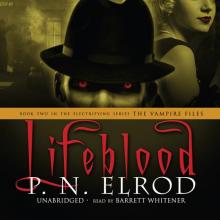 Lifeblood
Lifeblood Song in the Dark
Song in the Dark The Vampire Files, Volume One
The Vampire Files, Volume One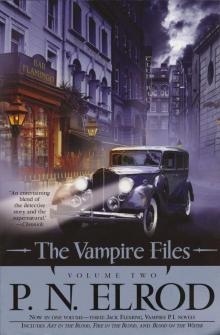 Fire In The Blood
Fire In The Blood Lady Crymsyn
Lady Crymsyn Dark Road Rising
Dark Road Rising The Adventures of Myhr
The Adventures of Myhr Dracula_in_London
Dracula_in_London Cold Streets
Cold Streets The Dark Sleep
The Dark Sleep The Vampire Files, Volume Two
The Vampire Files, Volume Two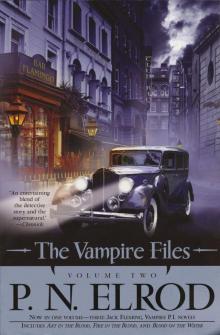 Blood on the Water
Blood on the Water The Vampire Files Anthology
The Vampire Files Anthology The Vampire Files, Volume Four
The Vampire Files, Volume Four A Chill In The Blood
A Chill In The Blood Bloodcircle
Bloodcircle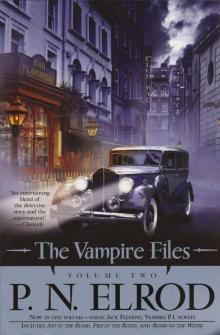 Art In The Blood
Art In The Blood The Vampire Files, Volume Three
The Vampire Files, Volume Three The Devil You Know
The Devil You Know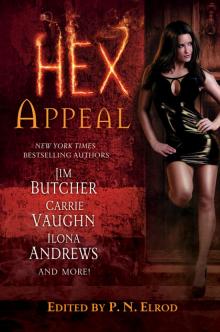 Hex Appeal
Hex Appeal Jonathan Barrett Gentleman Vampire
Jonathan Barrett Gentleman Vampire Quincey Morris, Vampire
Quincey Morris, Vampire Strange Brew
Strange Brew Lady Crymsy
Lady Crymsy The Hanged Man
The Hanged Man